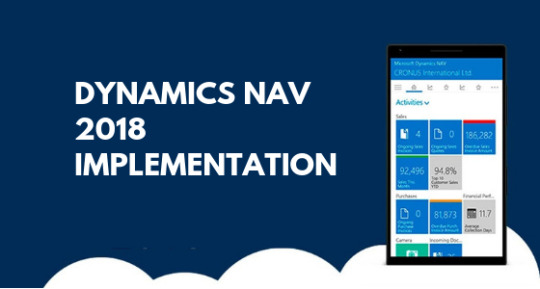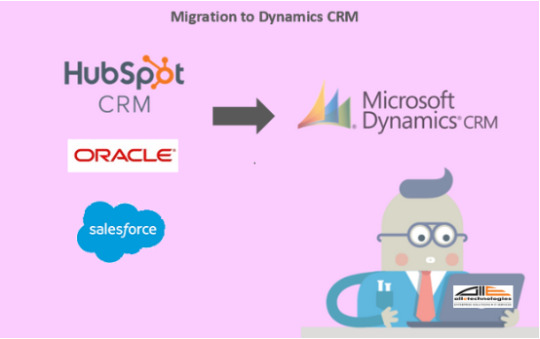Don't wanna be here? Send us removal request.
Photo

Microsoft Business Central Webinar. Follow this link for registration: https://bit.ly/2MWSaW7
0 notes
Text
Why Should your Business Invest in a CRM?
What is a CRM system

A CRM system is a package of business strategies, software and processes that facilitates organizations to build long-lasting relationships with their customers.
According to a research, loyal customers are worth up to 10 times as much as their first purchase. Therefore, for expanding business operations providing a seamless and outstanding customer experience is important in order to retain the customers.
Nowadays, markets are filled with a number of software solutions which help organizations enhance their customer relationships. However, the most popular solution used by organizations for improving customer relationships, as well as gaining new leads, is CRM system by far.
Defining CRM
CRM stands for “Customer Relationship Management” and refers to all techniques, strategies, technologies and tools used by companies for generating, retaining and acquiring customers. The software helps in smooth and seamless interaction with customers at each and every step in order to maximize profits.

The software is apt in gathering customer’s data from multiple channels. Hence, CRM is capable of storing detailed information on personal information, overall purchase history and even purchasing behaviour patterns of the customers.
What does CRM software stand for?
CRM software is a business application tailored with one primary purpose – improving customer relationships by providing businesses with efficient and smart tools for developing successful business strategy. Considering the aforementioned point, it is obvious that the CRM definition includes much more than it seems initially. It’s worth noting that implementation of this efficient tool can definitely help organizations in competing with rivals and taking an edge over them.
The best thing about CRM is that all these data are safely stored in unified database. Therefore, it makes it easy for the user to access and manage highly important data via one data source.
How does CRM work?
CRM has tracking features which are efficient in recording numerous customer interactions online. In addition, CRM helps in the automation of routine processes and provides managers with tools which help them in tracking and measuring company’s growth and productivity.
For a business to be profitable, proper alignment of the CRM strategy, customer needs and overall business objective is paramount. Companies should pursue their objectives with keeping customer needs and desire in mind. A properly developed CRM strategy results in better customer acquisition and retention.
In other words, a CRM software helps in accelerating crucial business operations, such as marketing, sales and services, to enhance customer experience and loyalty from initial contact to repeat purchases. Since, CRM software is meant to streamline company workflow, it can help businesses to fill the gaps between sales, marketing and customer service departments helping organizations with all sizes to meet their goals and objectives at a minimal cost.
How a CRM is deployed?
On-premise vs Cloud deployment
The decision of deploying CRM should be made wisely. Companies should make sure that the deployment model meets their business objectives. While companies might benefit from on premise deployment but they shouldn’t dismiss the advantages of a cloud CRM deployment.
With on premise CRM, a company needs to purchase the license beforehand. The software is located on the company’s servers and is a good choice for companies with strict security policy. This type of implementation process involves more time and IT resources. In this deployment, it is the buyer’s responsibility to ensure the constant maintenance of the on premise CRM system. The vendor still provides technical support and maintenance post CRM implementation.
On the other hand, a cloud CRM, stores data on the vendor’s servers. In this case, the users have all the access to the database anytime and from anywhere and most importantly, the vendor takes all the responsibility for security and seamless operations of the system. The only requirement for cloud based CRM system is an excellent internet connection, accompanied by a monthly or annual subscription which the vendor charges for hosting.
Mobile CRM
Nowadays with technological advancements and user spending more time on mobile devices, CRM vendors have understood the importance of Mobile CRM.
With reference from research conducted by Aberdeen Group, 65% of sales representatives who use mobile CRM have reached their sales quotas, while the same results are noted with only 22% of reps who used a CRM strategy without a mobile approach
Companies like Salesforce, Microsoft etc. have come up with Mobile apps where a user can easily access their CRM dashboard from their mobile devices.
Top CRM selling companies
There are a number of companies selling CRM in the market but selecting one among them is a nerve wrecking task. Being said that, here is the list of some popular CRM software available in the market:
· Microsoft Dynamics CRM
· Salesforce CRM
· Sage
· Oracle
· Hubspot
· Zoho
Conclusion:
Should your Business use CRM?
Regardless the size of your business, a CRM software provides consistency and helps in proper decision making. Even if you are a small startup with a small customer base, a CRM system can gradually increase the value of the organization.
All in all, CRM is an efficient business tool that will mark the future of your business. Businesses across the globe have already recognized the potential CRM can offer, especially in customer satisfaction. Therefore there is no question whether a business should use CRM or not.
0 notes
Photo

Business Central October 2018 Release Overview
0 notes
Photo

Challenges Faced in Implementing an ERP
1 note
·
View note
Text
Things to consider when Implementing Power BI

Microsoft Power BI is a suite of business intelligence tools that help you to connect to all your different data sources to get interactive rich insights. It brings in data from different data sources such as Google Analytics, CRM, SharePoint, ERP and various social media platforms.
Let’s dive in to the various steps involved in implementing Power BI:
Planning:
First and the foremost step in any implementation project is planning. This includes identifying different types of requirements such as data, architecture, user group and business for your solution evaluation. Also with any system implementation it is very important to define the business goals and objectives and how to analyze each measure by such as sales, geographic location, timely etc.
Designing Solution:
Make sure the Implementation Partner is able to anticipate and account future requirements while designing the solution that reflects all your business needs and goals. The major task of the implementation partner is to design a data warehouse while developing a BI solution.
Analyzing efforts involved in data extraction:
Once the requirements are analyzed, the partner has to see where all the data is and how Power BI can access to those data sources. Estimating the efforts that would be involved in extracting and transforming the data.
Providing Training and Support:
The software can only be an asset to the organization if the users know how to use the tools properly make them more productive. Power BI has similar features to Microsoft Office which makes it a user friendly tool, once the training is imparted, it is an easy task to run the tool. Post Implementation, identity the level of partner support that would be required to fix the bugs and issues to continue the ongoing performance of the Power BI tool.
Partner’s Involvement:
Be updated with the BI partner’s involvement in each phase of BI Implementation process – planning stage, data modelling and training and support level.
Why Microsoft Power BI Implementation Partner is required?
Power BI Implementation partner not only brings in-depth domain knowledge but also provides access to the best Industry practices through years of experience. The partner ensures seamless integration of Power BI suite of tools to your business data sources and databases to get high returns on investment. An Implementation Partner will understand your business challenges and design an easy to adopt dashboard that reflects your exact business requirements and goals. They can guide you to integrate various multiple visualization tools to create data models to get standardization across reporting and dashboards.
Why Alletec is the Power BI Partner for you?
Alletec is a Microsoft Power BI Partner and has successfully delivered data analytics to its customers across different industries such as Manufacturing, Trading, Retail etc. to help them enhance their organizational capabilities.
Our Power BI consultants have in-depth knowledge and have great understanding of planning and executing Power BI Implementation. Their expertise and commitment to efficiently deliver business value to the customers that produce a great return on their investments. From designing and developing insightful dashboards to providing support and training, Alletec’s Power BI professionals deliver it all.
If you are seeking to empower your business users with rich data insights, drop us a mail at:[email protected] or visit us at: https://www.alletec.com.
0 notes
Text
Things Developers should keep in mind while Implementing Dynamics 365 Business Central

Microsoft’s move to Cloud led to the launch of its next generation of Dynamics NAV as "The Dynamics 365 Business Central”. Business Central is a full functionality of NAV on Cloud which is the all-in-one business management solution to transform your business.
All the articles on Business Central till now have only covered on how easy the product is to use and adapt but very little emphasis has been given on its implementation process.
As its a new age ERP solution, it offers a wide variety of objects and customisation than ever before. Thus, making it crucial for organisations to consider various other factors just than the basic implementation process.
Following are the some of the things that should be kept in mind while implementing Dynamics 365 Business Central:
Planning
It is the first and the foremost step of every implementation project. As we know that Business Central is a cloud product that means all the updates are going to take place in real time. So the real task for the partners is to plan everything in advance keeping all the updates in mind. Yes, the task is going to be tedious as it involves anticipation of various factors but at the same time it would reduce the unfavourable outcomes that could occur in the development phases. All the risks and contingencies are identified, roles and responsibilities and KPIs are defined to measure the success of the project.
Evaluate the Functionalities
It is important for the implementation partners to be well-versed with all the functionalities offered by Business Central before they collect clients’ business requirements. Don’t just depend upon custom developments as the updates are occuring in real time.
Keep your Clients informed
Emphasis should be on how Business Central can contribute to your customer’s business transformation and keep them informed at each and every stage of the implementation process.
Following are the steps that are a part of Business Central Implementation Process:
1. Analysis Business Requirements:
Examine the business processes, map them to the software functionalities, design and customise the solution to fit the business needs of the client.
2. Configure the environment:
The next step in the implementation process is configuring the environment. The objective of this step is to set up the platform to upload the data, create various list of vendors, customers and other items related to your business operations.
3. Impart Training to the users:
It is crucial to impart the right training to the users who would administer and control the application to get them well-versed with the interface and the understanding of the application relevant to their specific role function.
4. Data Migration:
The next step is to migrate data through configuration packages.
The implementation partner along with the customer first reviews the list of items such as customers, vendors, other business related items that needs to be migrated to Business Central application.
5. Building Power BI Dashboard:
The partner would deliver training and guidance to build Power BI Dashboard to integrate data from Business Central application and other data sources to analysis KPIs for your business and study the gaps to convert them into an opportunity for the business.
6. Go-Live activities:
Once UAT (User test acceptance) is given and everything else is evaluated to set the application live, both the project team and the partner dedicate themselves to undertake go-live activities.
7. Post Go-Live, Support Activity:
Equal weight-age should be given to support activities once the application becomes live. It is important to adapt your system to the changing requirements of the business for the next upcoming years.
How Alletec can help you in D365 Business Central Implementation?
Alletec is a Microsoft Gold Competency Partner with expertise in delivering successful end to end NAV Implementation projects by developing leading industry solutions accustomed to the business needs of the customers across various industries such as Manufacturing, Construction, Trading etc. Our recent accomplishment includes the commencement of first Dynamics 365 Business Central Implementation project in New Zealand.
If you have looking for Business Central Implementation Partner, contact us at: [email protected]
0 notes
Text
Things to keep in mind before implementing NAV 2018

In today’s time, implementing an ERP (Enterprise Resource Planning) software isn’t a rocket science. However, implementing a successful ERP is a process involving quite an extensive pre-planning especially when we are talking about Microsoft Dynamics NAV.
There are a number of Dynamics NAV implementation partners in the US where you can get the software implemented for your organization. But the real task is choosing the right partner who can customize the solution according to your business requirements follows the right steps and processes involved for implementation. With that said, here’s a look the steps involved in Dynamics NAV implementation.
Requirement Analysis
This the first and the foremost step before the implementation of Dynamics NAV. It is very important to know the needs of the company.
Therefore, a thorough research and analysis is necessary so that an implementation partner can fully understand the process at your organization. On the basis of this knowledge an implementation partner would be able to customize your Dynamics NAV solution so that it fulfills the needs and requirements of your organization.
Implementation
The implementation of Dynamics NAV is done in separate parts. One of the effective method implies that all resources are used optimally and there must be an equal distribution of flow of information amongst all the stakeholders.This ensure an implementation of high quality which will be maintained within the agreed framework.
Imparting Knowledge
For smooth functioning of any ERP software, the users must be educated about the software. Therefore, an implementation partner must attach great importance towards the learning process so that the users must be experts in handling the Microsoft Dynamics NAV solution.
Upgrading
Upgrading and maintaining your company’s software solution is very important. Improved and new functions can both optimize and enhance the productivity of your company and thereby reduce the costs.
Maintenance and support
A project not only means implementation of latest version of Dynamics NAV, but also the development and support of previous versions.Maintenance and support is provided by some of the implementation partners of Microsoft.
How Alletec can help you in Dynamics NAV 2018 Implementation in US?
Alletec is a Microsoft Gold Competency Partner with expertise in delivering successful end to end NAV Implementation projects by developing leading industry solutions accustomed to the business needs of the customers across various industries such as Manufacturing, Construction, Trading etc. Our recent accomplishment includes the commencement of first Dynamics 365 Business Central Implementation project in New Zealand
If you have looking for Business Central Implementation Partner, contact us at: [email protected]
0 notes
Photo

Microsoft Dynamics NAV 2018 upgrade - What's New?
0 notes
Link
Microsoft Dynamics was released by Microsoft, marking the initiation of the next generation of intelligent business applications in the cloud.
https://www.alletec.com/community/index.php?topic=474.0
0 notes
Photo

Microsoft SharePoint 2017- Know all about the product here!
0 notes
Photo

Know all about Microsoft SharePoint here!
0 notes
Photo

Know more about Microsoft Dynamics AX here!
0 notes
Photo

The all new Dynamics 365 Business Central is here!
0 notes
Photo

Know all about Microsoft Dynamics CRM here!
0 notes
Photo

Know all about Microsoft Dynamics NAV here!
0 notes
Photo

Microsoft Dynamics AX Implementation
0 notes